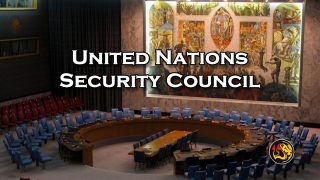By Stefan J. Bos, Chief International Correspondent Worthy News
WASHINGTON (Worthy News) – Outgoing U.S. President Joe Biden’s administration demands two permanent seats for African nations in the United Nations Security Council and an elected seat for a small-island developing nation.
The plan would transform the 15-member top body of the global organization, which has been essentially unchanged for decades and is mired in dysfunction and disagreements between existing permanent members.
U.S. Ambassador to the United Nations Linda Thomas-Greenfield announced the proposal as part of her nearly four-year effort to give more say to countries long isolated from decision-making on world peace and security.
Her announcement comes as the United Nations General Assembly prepares to convene on September 22-24.
It was unclear if negotiations surrounding the reforms would be ready by the general assembly’s time.
However, a senior administration official said the U.S. is prepared to pursue “text-based negotiations,” prepare amendments, and “get to work on a resolution for a vote in the general assembly to amend the U.N. Charter.”
POWER LIMITS
Yet Thomas-Greenfield later said Washington opposes giving veto power to the African countries holding the two permanent seats because that would make the Security Council’s work “dysfunctional.”
Critics said her view showed the limits in how much power Washington wants to give to any other country. While Security Council resolutions are legally binding, targeted countries often ignore them.
However, Thomas-Greenfield still believes the proposal would increase the influence of long-ignored nations.
Africa has three non-permanent seats on the Security Council, but that doesn’t allow African countries “to deliver the full benefit of their knowledge and voices,” she said.
“That is why, in addition to non-permanent membership for African countries, the United States supports creating two permanent African seats on the council. It’s what our African partners seek and what we believe is just.”
The move also highlights the geopolitical reality nearly 80 years after the end of World War Two, with Africa increasing its political and economic clout.
COLD WAR
The Security Council held its first session on January 27, 1946, but its efforts were complicated by the Cold War between the West, the Soviet Union, and satellite states.
Yet it authorized military interventions in several armed conflicts, and following the collapse of the Moscow-led Soviet Union, U.N. peacekeeping efforts increased.
Since the early 1990s, the Security Council has authorized military and peacekeeping missions in Kuwait, Namibia, Cambodia, Bosnia-Herzegovina, Rwanda, Somalia, Sudan, and the Democratic Republic of the Congo.
The Security Council still consists of fifteen members.
Among them are the five permanent members: China, France, Russia, the United Kingdom, and the United States, who were the victors of World War II or their recognized successor nations.
Copyright 1999-2024 Worthy News. This article was originally published on Worthy News and was reproduced with permission.
The following code is how the above article is generated with the Worthy Suite WordPress Plugin.
[worthy_plugins_news_story_body]This is how you display a story with an image.
US Wants Permanent African Seats In Security Council

By Stefan J. Bos, Chief International Correspondent Worthy News
WASHINGTON (Worthy News) – Outgoing U.S. President Joe Biden’s administration demands two permanent seats for African nations in the United Nations Security Council and an elected seat for a small-island developing nation.
The plan would transform the 15-member top body of the global organization, which has been essentially unchanged for decades and is mired in dysfunction and disagreements between existing permanent members.
U.S. Ambassador to the United Nations Linda Thomas-Greenfield announced the proposal as part of her nearly four-year effort to give more say to countries long isolated from decision-making on world peace and security.
Her announcement comes as the United Nations General Assembly prepares to convene on September 22-24.
It was unclear if negotiations surrounding the reforms would be ready by the general assembly’s time.
However, a senior administration official said the U.S. is prepared to pursue “text-based negotiations,” prepare amendments, and “get to work on a resolution for a vote in the general assembly to amend the U.N. Charter.”
POWER LIMITS
Yet Thomas-Greenfield later said Washington opposes giving veto power to the African countries holding the two permanent seats because that would make the Security Council’s work “dysfunctional.”
Critics said her view showed the limits in how much power Washington wants to give to any other country. While Security Council resolutions are legally binding, targeted countries often ignore them.
However, Thomas-Greenfield still believes the proposal would increase the influence of long-ignored nations.
Africa has three non-permanent seats on the Security Council, but that doesn’t allow African countries “to deliver the full benefit of their knowledge and voices,” she said.
“That is why, in addition to non-permanent membership for African countries, the United States supports creating two permanent African seats on the council. It’s what our African partners seek and what we believe is just.”
The move also highlights the geopolitical reality nearly 80 years after the end of World War Two, with Africa increasing its political and economic clout.
COLD WAR
The Security Council held its first session on January 27, 1946, but its efforts were complicated by the Cold War between the West, the Soviet Union, and satellite states.
Yet it authorized military interventions in several armed conflicts, and following the collapse of the Moscow-led Soviet Union, U.N. peacekeeping efforts increased.
Since the early 1990s, the Security Council has authorized military and peacekeeping missions in Kuwait, Namibia, Cambodia, Bosnia-Herzegovina, Rwanda, Somalia, Sudan, and the Democratic Republic of the Congo.
The Security Council still consists of fifteen members.
Among them are the five permanent members: China, France, Russia, the United Kingdom, and the United States, who were the victors of World War II or their recognized successor nations.
Copyright 1999-2024 Worthy News. This article was originally published on Worthy News and was reproduced with permission.
[worthy_plugins_news_story_title]
<div style="text-align:right; padding:0px 0px 10px 15px; float:right; width:300px;"><img src="[worthy_plugins_news_story_image name=sm_medium]" alt="" /></div>[worthy_plugins_news_story_body]